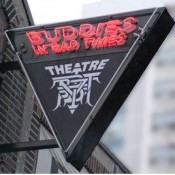Performance and activism can go together like peas and carrots…if you do it right. We asked [color]Nicolas Billon[/color], writer of [color]The Faroe Islands[/color] to give us his thoughts on the matter.
PE
PEPER
RRFO
FOFOR
RRMANCE
MANCEMANCE AND
ANDAND ACTIVIS
ACTIVISACTIVISM
MM
In plays, there is often a moment when one character turns to another (or several
others), pauses, and says something along the lines of, “Did you know that…”
followed by a fact or a statistic or a moral position. That’s the moment when I
know I’m in trouble.
Because that’s when the play becomes about something. The drama mutates into
edification, characters into mouthpieces, and monologues into sermons. That’s the
moment when my seat becomes a pew.
I empathize with the writer’s impulse, guided as it often is by good intentions. But
when these lead us down the road of didacticism or, worse still, demagoguery, we
must be wary. Any attempt to substitute for the audience’s conscience ensures a
work’s swift demise.
Perhaps a good first step is to encourage perspective over convictions, and trust
that an audience will reach the same conclusions as the writer.
Thornton Wilder describes this with an eloquence that makes my heart ache: “If an
author refrains from intruding his point of view, readers will be nettled, but will
project into the text their own assumptions and turns of mind. If the work has
vitality, it will, however slightly, alter those assumptions. I suspect all writers have
some didactic intention. That starts the motor. Or let us say: many of the things
we eat are cooked over a gas stove, but there is no taste of gas in the food.”
And, as shows like DV8’s “To Be Straight With You” or Victoria Theatre’s “Aalst”
have shown, when that happens it results in powerhouse art.
– Ni
NiNico
cocol
llas Bi
as Bias Bil
lll
llo
oon
nn
The Faroe Islands is on stage February 22-24. Click here for more information.
For more about Nicolas, visit his website.

